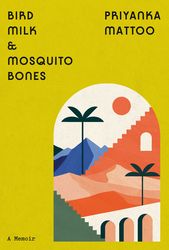Beauty so untouched that it is called ‘paradise on earth’, yet it feels like staring at the sun―painfully beautiful. Such is Kashmir, with its beauty and wounds intact. The Kashmiri phrase―chhari daud te mahe adij (bird milk and mosquito bones)―is used when someone is describing things so rare and precious that the listener should question their very existence. In Bird Milk and Mosquito Bones: A Memoir, Priyanka Mattoo uses the phrase to describe all the things her family gathered from around the world to decorate their dream home in Kashmir’s Natipora.
Born a Hindu in Srinagar, Mattoo’s parents moved abroad in the 1980s, with the sole intention of earning enough to build their dream mountain dwelling. They cemented their dream home with love and embellished it with precious souvenirs from around the world. When it was burned down by militants, they not only lost a home and a dream but also a sense of belonging. The insurgency of the 1990s further forced them to have a home away from home.
“If only the house had been swept away in a flood, incinerated in a conflagration, or levelled in an earthquake. All three were likely in Kashmir, and a single event might have been easier to explain,”writes Mattoo. “We never moved back to Kashmir, because we couldn’t. We just kept moving, but nothing else ever felt like home, and nothing still does.”
Mattoo’s memoir is not an elegy on Kashmir, but the story of a displaced Kashmiri who found solace in impermanence, in search of a home, one who lives with the sense of being robbed of belongingness. “My Americanness has always felt like a costume,” she writes. “A well-tailored costume, but still an overlay, covering up who I actually am and how I really feel.... It’s so strange and frustrating to miss a sense I don’t even remember possessing: that of being ‘too far away’ from somewhere.”
As an immigrant, Mattoo feels many people suffered much more than her family did. Her privileged background empowered her to find her place in the world―her grandfather would emphasise on the need for young girls to indulge in pursuits of the mind rather than learning “ladies work”. Still, Mattoo feels the need to be the voice of her community, to tell their stories multiple times, and writes the book as a love letter to them. She calls them “tough as nails, but quick to soften. Insular but fiercely loyal. Eccentric but warm”.
Mattoo’s voice is a refreshing take on the Kashmiri saga. Unlike Farah Bashir’s Rumours of Spring: A Girlhood in Kashmir, which chronicles the life of a Kashmiri living on the verge of war and death, Mattoo’s Kashmir is a promised land, a faraway home that she could barely experience. With the burning of her family home, her Kashmiri ties weaken, leading her to different parts of the globe―in 40 years, she navigates through 32 different addresses. “I take Kashmir, and India, everywhere with me,” she writes. The latter half of the memoir is shaped by Mattoo’s experiences of finding her place in life, embarking on the writing journey and navigating through several roles she plays. With the story oscillating from a gripping lived reality to her own personal narrative, Mattoo leaves the readers’interest fluctuating.
No narrative stemming out of this ‘paradise’ can be devoid of substance―every voice echoes the lived reality of the historical tragedies experienced either from near or far. This memoir is another reminder of what Kashmir, despite its troubles, continues to be: chhari daud te mahe adij.
BIRD MILK AND MOSQUITO BONES: A MEMOIR
By Priyanka Mattoo
Published by Penguin Viking
Pages 304; price Rs699


